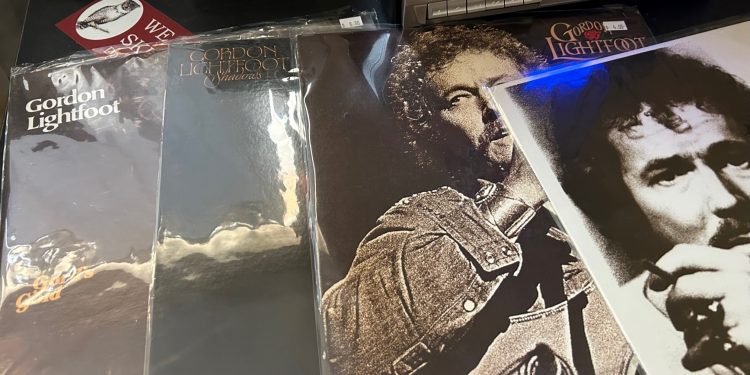This is a story about everyday commerce. It’s also a story about Main Street, and about the relentless pull of memory, and about the endurance of cash. It’s a payments story.
What it’s not: A story about my wife’s car needing its studded snow tires removed, finally. But if not for that, this story wouldn’t have its denouement.
Let’s dig in.
First, Gordon Lightfoot Died
News of the great Canadian troubadour’s passing landed on May 1, and what can be said about that except that it’s a major bummer? I joined several generations of music lovers in lamenting the loss of another hero, then I started playing the catalog and reeling through some chromatic memories of youth.
The problem was, my preferred venue for music—on the turntable in my office—was decidedly light on Lightfoot. It’s only in the past few years that I’ve resumed construction of a vinyl collection that got mostly abandoned with the rise of CDs. (Yes, I’m old. Leave me alone.)
This, I decided while I streamed Gord through my personal computer, is a situation that needs fixing.
(A digression, if I may: The gentle sound of folk and light rock flooding my office is the perfect background for work. The louder stuff—and believe me, I have it—is more suitable for after-hours. Also, get off my lawn.)
Second, Spring Is Here
My wife’s car, a Volkswagen new Beetle, isn’t ideal for the northern clime we live in, but that’s neither her fault nor the Beetle’s: She bought the car (“Lola”) in North Carolina, long before she imagined she might live in a place where it snows from October to May, and sometimes beyond. The purchase of a set of studded tires some years back gave her the requisite confidence and utility of being able to drive in adverse conditions.
But as they say, what goes on must come off. Here it is, May, the grass is growing (remember what I said about my lawn), and it’s time for regular tires. We took her car to our usual place, then returned a few hours later to retrieve it. This is a payments piece, so let me say: We paid for this tire-swapping service with a debit card. But this isn’t about that.
No, our regular tire place is just down the street from Cameron Records.
Now we’re cooking.
Third, Cameron’s Bargain Bins Are a Paradise
After Elisa got her car back and headed home, I drove a couple of blocks to the record store. I stood at the door as the owner, TJ, was pulling back the curtain and unlocking the door. Coincidentally, that day was the first of his fourth year in business, and I was his first customer.
I told him what I wanted, all the Lightfoot I could carry, and he led me to the stacks. In time, I emerged with four albums: Gord’s Gold (1975), Shadows (1982), Dream Street Rose (1980), and Summertime Dream (1976). There’s more to dig out yet, but I’ll have to make a longer-term project of it. I work for a living.
I presented my haul. TJ, who was still getting his systems fired up, tallied the price in his head ($21!) and asked me the key question:
“Cash or card?”
I went into my pocket for my Visa debit card. That’s when I saw a single forlorn twenty sitting there in the recesses of my wallet.
“I was going to say ‘card,’” I said, “or I could give you this twenty and you can skip the interchange fees.”
“Deal,” he said.
The interchange would have run him about 32 cents, so he sacrificed something, but the subsequent reward he can count on is considerable: I’ll be back, for the rest of the Lightfoot and for much, much more. Meanwhile, I saved a buck on what was already a screaming deal, got my nostalgia fix, and fulfilled a personal shopping credo.
Fourth, the Case for Mindfulness in Shopping
I would never present myself as a paragon of commercial virtue, but I do have some guiding principles that inform my purchasing and payments decisions:
- Buy at the point of discovery: If a merchant—whether online or brick-and-mortar—has put something in front of me that catches my attention, the reward for having done so is the sale.
- Support the culture: I concentrate my buying of art where it does the greatest good for the makers and those who share their ecosystem. I buy new music mostly through independent artists and labels. I get the old stuff from TJ. Books come from independent bookstores, where I also go for readings and other programming. It’s important not just for the local circulation of dollars but also for the cultural life where I live and travel.
- Recognize what’s in the wallet: I’ll see TJ again soon, and next time I’ll come with plenty of cash, ready to pay full price and save him the interchange. It’s important to me that he’s still standing in Year 5, Year 6, Year 7 …
Cash isn’t dead, but for many buyers—me included—it’s not always convenient. Javelin Strategy & Research data consistently backs up this contention:
Consumers want to pay the way they want to pay, and when a chosen method isn’t available to them, they tend to get frustrated.
So it is with me. I want to pay TJ in cash from now on. For a basket full of groceries, say, my card is probably more suitable.
The choice is the point. Well, that and having a stack full of Gordon Lightfoot hits and deep cuts …







